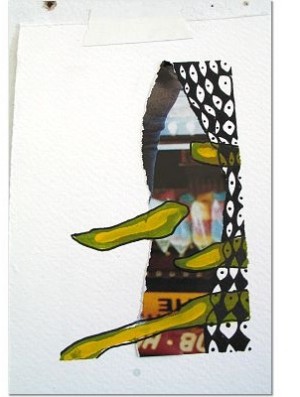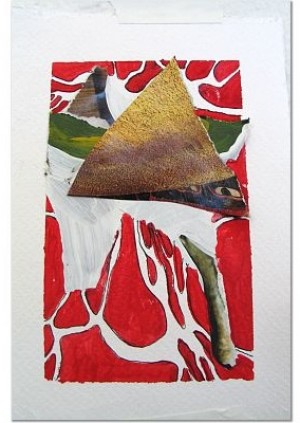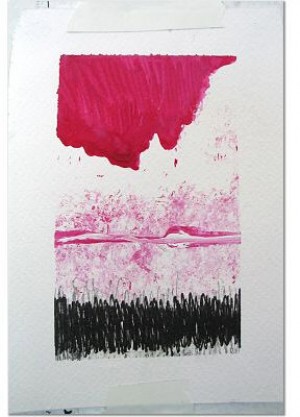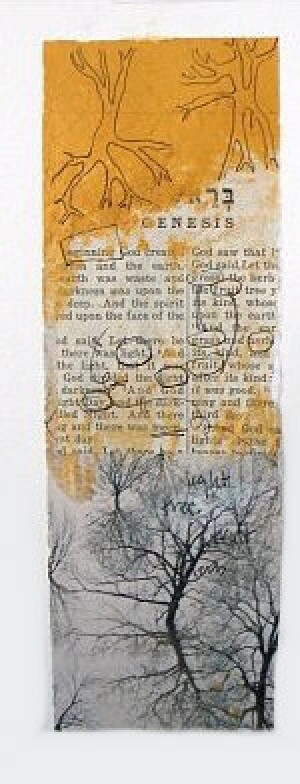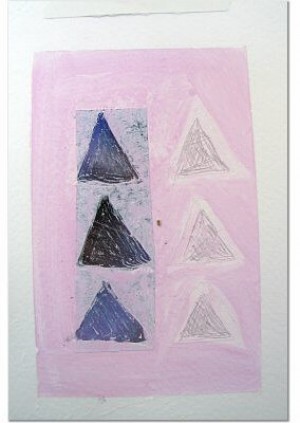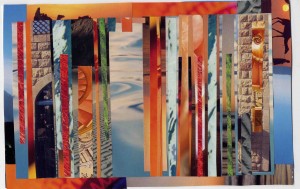The Sephardic Poem
1. Yehuda Halevi’s Journey to the Promised Land
In Toledo we sat at a small round table
beside a rose garden and the synagogue,
our children grouchy from the long walk and the heat—
I wanted to bump into your ghost
as you chanted that your heart was in the east.
I wanted to hear your songs of praise,
drinking wine with the Arab poets, composing,
on the spot, a call and response—
after all, it was the Golden Age,
still a few centuries before the signed order
and the gate closed. So let’s quaff
the grape’s blood, let’s uncage the stag of love,
weave our names into our lines that sing
of this longing to journey, against advice,
to the mystery and the footstool,
the law and its fulfillment, the promised land.
From the Cairo Genizah we know your whereabouts,
or most of them, because Jewish law forbids
destruction of any document with God’s name,
and everything you wrote had God’s name.
You made it to Egypt, but in Fustat
you went back to your old carousing,
writing poems celebrating lutes and dancers,
their ankle bracelets and their black hair:
I would fall for them all, you chanted
at the poetry contest, for their perilous red mouths.
For their silver bells of apples and pomegranates.
How could you put the world behind you
when you were still in love with it?
Yehuda, we journeyed to the plaza named for you
and for a few Euros ordered espressos
and fantas and inquired of someone—anyone—
how far the empty synagogue?
Why does this Jewish Quarter have no Jews?
Let’s have more lutes, you commanded:
The foolish heart forgets how old it is.
Finally you sold your expensive turban,
left Egypt in a rough boat, and sailed
into the hands of God. You stole into
the storehouse of poetry, crept inside
and sealed the door, turning into legend.
Did you touch foot on that elusive soil?
Did you bow down at the Wall?
Or did you die in your desire?
Don’t fear, Yehuda. Over the years
your poems became prayers we sing
in the synagogue, as the Torah is lifted,
as the congregation rises, chanted
on the day of mourning, the day
we remember not one but two temples
destroyed, Jerusalem laid to waste,
the people dispersed. Your love poems,
it’s true, were made of dew and fire,
but your real instrument was your soul,
which you strummed sweetly, like a harp,
like this warm wind breezing through these roses—
our small portion of paradise, even in this exile.
2: The Former Jewish Quarter in Seville
“I wish I could show you more,”
Moises says as he walks me
to a far corner of the Alcazar courtyard,
through a narrow opening,
and we arrive on the uneven cobblestones
of the Bario of Santa Cruz,
the Juderia—the Jewish Quarter—
“the former Jewish Quarter,” Moises emphasizes—
I don’t show you what isn’t there:
the kosher butcher, the mikveh,
the synagogue where I’d introduce you
to the rabbi and we would daven together
and chant lecha dodi
in our strange Sephardic melodies.”
Instead, we pass through La Carne Gate,
walk past the busy Plaza Saint Maria Blanco
where tourists sip espressos
and he shows me remnants of the wall
Alphonso X built for the Jews
“for their own protection. Evidence
claims they’d been there since the 3rd Century,
though legend insists they arrived
before the crucifixion so they wouldn’t be blamed
and they’d point, even further back,
to the Book of Obediah: and the captivity
of Jerusalem which is in Sepharad.”
We proceed through narrow alleys
shaded by fully-fruited orange trees,
past the open-roofed patios,
the gardens behind fences, pausing
at the only remaining former synagogue
become a church become a hospital
become a church again, which I duly photograph.
We stop at Susona Street, named
for the beautiful Jewess whose love
for a gentile inspired her to confess
her father’s plot against the inquisitors,
and so he was caught and burned
at the stake at Spain’s first auto-de-fe:
“act of faith,” Moises explains.
“In 1481 Susona joined a nunnery, and,
hearing the wails of her father
through the fiery discourses of the Friar,
willed that after her death her skull
be hung above her front door—
and so it was, for a hundred years.”
He probes: “Can you still hear them?
The 700 men, women, and children,
forced to eat pork?” And do I also hear
the thousands of peasants gathering,
as if for a fiesta, in this very plaza,
insulting the accused conversos wearing
the sambenito, the hooded cloak,
decorated with devils thrust into flames of hell?
And who wouldn’t, bound to the pyre,
say they would convert? Would I? “How much
does it mean to you? That God?
Today, there are only a few left—
it’s not easy to keep the laws.
I get my meat from Madrid.”
He shrugs. “One last thing.”
We walk toward steps leading underground—
Moises puts his fingers to his lips,
as if not to disturb something,
descending into the dark—
a parking garage, lined with Citroens,
BMW’s, Peugeots—packed
in their paid spaces—Moises
squiggles in front of a white van
and points to the wall: a display case,
lit up: inside, a single tomb
of ancient stone—“when they dug the ground
for this garage, they came across—
a cemetery—244 Jewish graves.
They preserved only this one,
and continued digging.
The Muslims have their mosques,
the Christians their cathedrals.
And we Jews? This one tomb,
in an underground garage.
I wish,” he whispers, as we ascend the stairs:
“I could have shown you more.”
3: “1492/Columbus was a Jew,”
my father would chant, through cigar smoke,
and I thought it was just another of his little shticks
that weren’t very funny, little annoying puns he’d spit out
when I least suspected it, which he somehow
found a malicious humor in repeating.
But now I read that Columbus really could
have been a Jew, or the next thing to it,
a converso, though of course he was evasive
about his origins. Was he Italian? Was he Spanish?
Yet he kept company with Jews,
and it was the powerful converso couriers
who pressed for and then helped finance his journey.
Did they see it as an escape
from the expulsion they knew was coming?
Part of a secret plan to the promised land?
Even as Columbus made his arguments,
the Alhambra Decree was being drafted:
In the year 1480 we ordered the Jews
be separated from cities and towns…
and we ordered an Inquisition be established.
And weren’t the Jews instrumental in maps
and compasses? And wasn’t the quadrant,
the essential device used for determining
a ship’s position, known as the Quadrans Judaicus?
And the astrolabe? Wasn’t it developed
by Abraham Zacuto, Royal Astronomer of the Lisbon Court?
And the preferred astronomical tables of the day?
Weren’t they prepared by Jewish astronomers?
And didn’t Columbus possess his own copy?
Because every day, the edict continues, it appears said Jews
increase in continuing their evil and harmful
purposes wherever they reside and converse.
And didn’t Columbus date his correspondence
from the destruction of the Second Temple?
And what about the odd symbols in his letters
to his son resembling the Hebrew abbreviation
for beEzrat Hashem, “with the help of God?”
And didn’t he use Old Testament allusions?
It is agreed and resolved, it asserts, that all Jews
and Jewesses be ordered to leave our kingdoms,
and that they never be allowed to return. And
didn’t he write: “Let them give me the name they will,
for, after all, David, a very wise King,
kept ewes and lambs and was later made King
of Jerusalem, and I am the servant of the same Lord
as who raised David”? And it declares: that
they leave with their sons and daughters,
their servants and relatives, large and small,
of whatever age, and they dare not return
to our lands, not so much as take a step on them
nor trespass upon them in any manner whatsoever.
And wasn’t the scheduled sailing: August 3rd.
the deadline for the Jewish departure forever?
And didn’t the six conversos who boarded his ships
dream they might find a kingdom of Lost Tribes?
And so that this may come to notice of all,
it affirms, and so that no one pretend ignorance,
we order that this edict be proclaimed in all the plazas
and usual meeting places in the city.
“1492/Columbus was a Jew,” my father croons,
from out of his great expulsion, the expulsion
from which there has been no return, except
these quips, these puns, these riddles of history:
And let it be done, it concludes, by the town crier
in the presence of the public scribe. I heard this edict.
I was in the Hall of the Ambassadors in the Alhambra
where it was signed on March 31, 1492,
and though I was there on May 16, 2011, I heard it,
I heard it in the air whispering: Any Jew
who does not comply will incur punishment by death.
It was spring when it was proclaimed, it was summer
when it was executed. Have you ever been despised?
Have you ever been dismissed? Have you ever traveled
into the dark unknown?
Have you ever held nothing in your arms but another world?
Have you ever wanted to hear your father sing again?
4: From Moses to Moses
“From Moses to Moses there was none like Moses.”
— Jewish saying regarding Moses Maimonides, 12th Century philosopher
Great Teacher, was the Divine an actual voice? Or was it an inspiration?
Does its Name consist of four letters or twelve?
Or rather does it consist of forty-two? And how to speak
that Name? Should we spit the letters out with rapid speed
or pause significantly between them? Either way, we stutter,
we mispronounce since we lost the secret the wise men shared
once every seven years with their smartest disciples.
Of course, silence is the ultimate letter, as it says in some psalm.
Revered Rabbi, are we near God or remote? Should we approach or recede?
You said: Between God and us there is no comparison whatsoever.
He cannot be the object of human comprehension.
Our only knowledge is knowing we don’t have enough knowledge:
commune with your own heart on your bed, and be still.
I’m trying to find a way into you, Famous Doctor, but it’s like
trying to describe the snow-capped Sierra Nevada Mountains
we drove through on the way to Cordoba, it’s like
trying to comprehend the Alhambra from the perspective
of one of those gypsy caves perched on the other side of the valley—
impossible to take it all in, your life, your works, but
there’s something romantic about how your family fled
the Almohads when you were thirteen, your bar mitzvah gift:
a life of exile, something legendary about how you learned
Torah and Talmud on the run, memorizing the tractates
as you fled the Muslims, then the Christians, all the while
following the disputations of the scholars, something assuring
in your teaching us to utter the Muslim formula: “Allah is God
and Mohammad is his Prophet,” and live, defending the principal
of saving our own lives. In Fez you yourself had to hide
your rituals, say the blessings in secret, read the Holy Books
under cover, but you never forgot who you really were,
in your heart: it’s not the externals, you wrote, but the essence.
No fanatic, you understood the middle path, balancing faith
with reason. Mocked for being the son of a butcher’s daughter,
you’d sneak off to seek refuge in the empty woman’s section.
Your scholarly father called you a sluggard that was born
only for the lowest level, so you fled and were finally found,
a few years later, in the synagogue, expounding on the holy texts.
I’m trying to read you, Prince of our People, but the hay baler
is rumbling through the field, lifting the stocky bales for the cows,
and here you are, talking about the Messianic Age
and I wonder: isn’t this, too, a kind of bliss? Studying
your Guide for the Perplexed on this shadowed porch, soft
breeze quivering the rhododendrons, newly hatched robins
whistling through the afternoon? And isn’t reading your rhythms
a kind of Messianic Age? Because you say: In the time of the Messiah,
there will be more time for study.
Tell me, Namesake-of-the-Original,
did you write your thirteen principals of faith
so we could rise above this world’s suffering?
And that the only reward for a good deed
is the good deed? Because you knew the real danger—
that your people could disappear? Could you retrieve us
from our confusions? Could you writings save us?
You were convinced the Messiah would come, though
not in your lifetime, which recalls Kafka’s joke
that “there’s hope, but not for us.” But you were more specific:
He would arrive in the year 1216, the belief an old family tradition,
but, really, it was because you wanted us to understand
that there would be an end to this misery. Rambam—
can I call you that now?—I wish you could sit in this seat overlooking
the garden, the spring evening in this time of roses and irises,
of mowers and children out of school, in this soft air,
and note the blossoms on the grapes and blueberries,
listen to the mourning dove’s sad five note song,
observe the unexpected nests and know no desire
but what the earth desires in this smeared evening light,
breathe in the intoxication of what the wet dark brings.
You wanted to prove once and for all the incorporeality of God.
You wanted your great code to displace the Talmud itself.
You wanted your book to guide us through the impossible thickets of the law.
God has nothing to do with time and space, you said.
Nothing that can be applied to Him can be applied to us, you said.
You were a doctor and believed that to heal the body is to heal the soul.
And so: coffee, your book, June, still dew-drenched,
the mock-orange still in its white bloom, and now six deer leaping
on the far edge of the adjacent field—let’s look up
into the almost nothing, an empty field, yet full
of my own ignorance, full of grasses I can’t name,
full of precise wildflowers and who-can-count spider webs,
of empty spaces with their secrets and infinite goings-on.
In Cordoba they make a big deal of you, what with your regal sculpture
in the square near the only remaining synagogue—
you’re sitting, holding your book that the fanatics burned
because reason was too much for them, some whispering
your name to the Inquisitors, but it’s still available
in shops beside reproductions of your statue, one of which
my daughter Bella bought me and is now sitting on my desk
as I write this, beside a vase of orange and yellow lilies.
And if I touch your left toe, will I gain each year in wisdom?
Certainly not the learning you acquired—doctor, rationalist,
compiler and arbitrator—bearded, capped, turbaned copper
figure sitting, back straight, on the backless stone white chair—
the scholar’s throne—your right hand clasping the book as if,
like the eagle you were compared to, measuring the Biblical flights
and ravishing the world’s accumulated knowledge,
your left hand clasping the arm of your chair
as if holding yourself to this place, where you knew
you were necessary. In this gift my daughter bought me
in Cordoba, there is a sadness to your face.
And though I know you did not approve those foolish persons
who are extravagant in praise, I often prefer to be misguided,
happily perplexed, in the cool of this summer evening
and sipping wine, which you said, in your treaty on foods,
is good for me, that it is the most exquisite of all nourishments,
how it sustains and encourages the digestive process.
5: From Spinoza’s Book of God
My mother took these books out
of the Park Synagogue library
and never returned them, these books
on Halevy and Maimonides and Spinoza
and the secret Jews, she snuck them out
the way she’d wrap dinner rolls in napkins
and secure them in her large black purse.
And so I’m writing about these Jews
she’d want me to honor, though
when I was thirteen I sat and stood and sat
and stood beside her during the service,
and suddenly I turned to her and said:
I don’t believe this. Did she imagine
that nearly half-a-century later, I’d struggle,
late summer morning, under a glassy sky,
with you, Benito, though I’d rather call you Baruch,
another non-believer, who, in your Book of God,
say that the more we know God the more we love Him,
and how it’s all about essence, and He
doesn’t live in the synagogue:
somewhere else, out there: in the earth,
somewhere else, in here: the soul.
I don’t believe this, we both declared,
for which I received a sideways squint
and you got excommunicated,
though clearly we believe in something,
clearly there’s a perfection somewhere—
the absolute stillness of this early afternoon,
deepening in its mixture of shadowed light.
God, you said, like Nature, is infinite.
There’s a slight quivering of honeysuckle,
an afternoon, perhaps, like the one
on July 27, 1656 when you were damned
by a proclamation signed by your own people:
In accordance with the decisions
of the angels and the saints,
with the approval of the holy God
and the entire congregation. A child,
as you mastered Torah and Talmud,
you heard the auto-de-fe screaming
through your window. So to your own mind you submitted,
excommunicating yourself before they could excommunicate you.
As for me, to my mother I paraphrased Dickinson:
“Some keep the Sabbath by going to synagogue,
I keep it staying at home.”
But she didn’t command me out of her presence,
she didn’t denounce me to the congregation,
she didn’t, before God, declare:
Cursed be he during the day and cursed be he during the night.
Instead she gave me these secret books
and the memory of her hidden bread:
“because you never know,” she’d whisper.
“You never know when you’ll be on your own.”
You preferred grinding glass, the clear, fine dust,
a bedstead, an old Turkish robe, a few pair of socks
in need of mending: no stone, no marker,
just your one hundred and eleven books arguing
what the prophets claimed: that to know God
it is impossible not to love God—
you renegade, you defector, you transgressor, you Jew.
![[the current issue of ZEEK]](../../image/2/100/0/5/uploads/leftistethicistgraphic-52842c6a.png)
- 5000 Pages of Zeek
- Founded in 2001, Zeek was the first Jewish online magazine, and we have over 5000 pages online to prove it, all available free of charge. Read more in the Archive.
More articles by
Philip Terman
More articles in
Arts and Culture
- Euphoria, Curiosity, Exile & the Ongoing Journey of a Hasidic Rebel: A Q & A with Shulem Deen
- Poet Q, Poet A: Jews Are Funny! Six Poets on Jewish Humor, Poetry & Activism and Survival
- Tackling Hate Speech With Textiles: Robin Atlas in New York for Tu B’Shvat
- Fiction: Angels Out of America
- When Is an Acceptance Speech Really a Speech About Acceptance?


